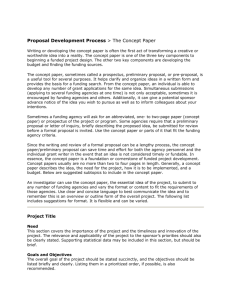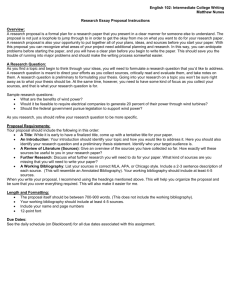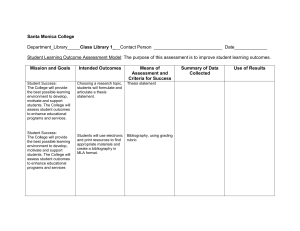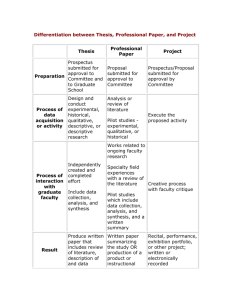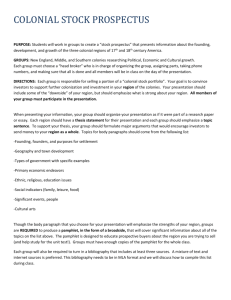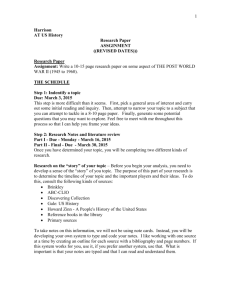1 SENIOR HONORS THESIS SEMINAR Sociology H190A Fall 2012
advertisement
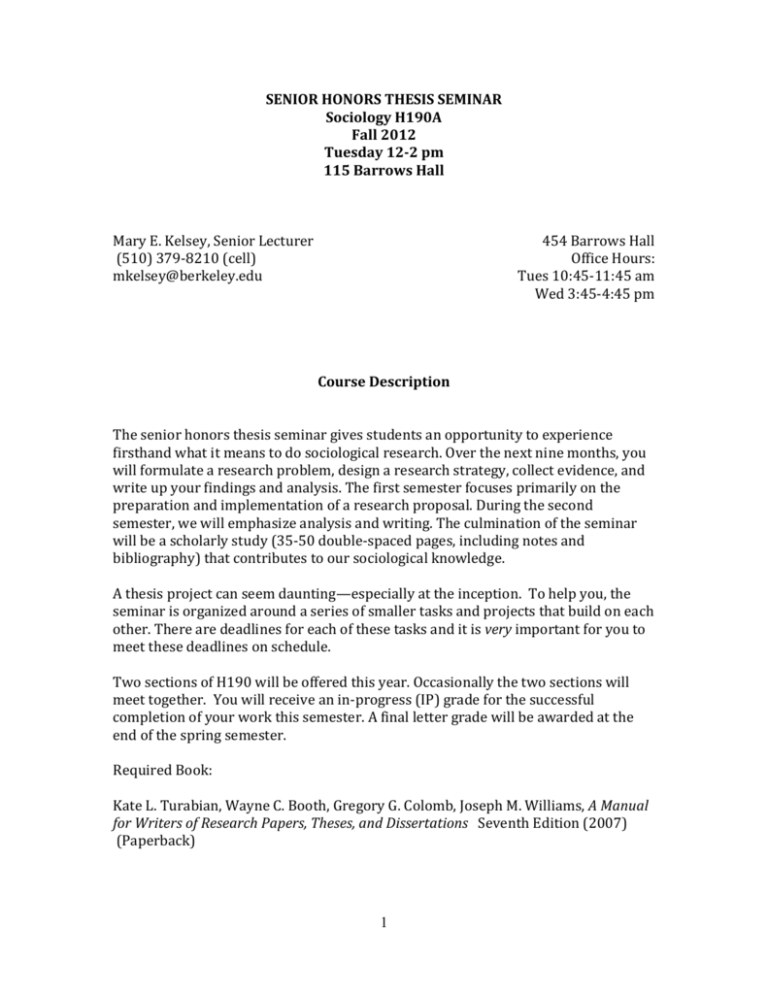
SENIOR HONORS THESIS SEMINAR Sociology H190A Fall 2012 Tuesday 12-2 pm 115 Barrows Hall Mary E. Kelsey, Senior Lecturer (510) 379-8210 (cell) mkelsey@berkeley.edu 454 Barrows Hall Office Hours: Tues 10:45-11:45 am Wed 3:45-4:45 pm Course Description The senior honors thesis seminar gives students an opportunity to experience firsthand what it means to do sociological research. Over the next nine months, you will formulate a research problem, design a research strategy, collect evidence, and write up your findings and analysis. The first semester focuses primarily on the preparation and implementation of a research proposal. During the second semester, we will emphasize analysis and writing. The culmination of the seminar will be a scholarly study (35-50 double-spaced pages, including notes and bibliography) that contributes to our sociological knowledge. A thesis project can seem daunting—especially at the inception. To help you, the seminar is organized around a series of smaller tasks and projects that build on each other. There are deadlines for each of these tasks and it is very important for you to meet these deadlines on schedule. Two sections of H190 will be offered this year. Occasionally the two sections will meet together. You will receive an in-progress (IP) grade for the successful completion of your work this semester. A final letter grade will be awarded at the end of the spring semester. Required Book: Kate L. Turabian, Wayne C. Booth, Gregory G. Colomb, Joseph M. Williams, A Manual for Writers of Research Papers, Theses, and Dissertations Seventh Edition (2007) (Paperback) 1 Schedule of Classes Part I (Weeks 1-4): Selecting a Topic Week 1: August 28 Introduction Week 2: September 4 Discussion: How to design a senior thesis research project; begin brief oral presentations on projects Required reading: 1) Kate L. Turabian, Wayne C. Booth, Gregory G. Colomb, Joseph M. Williams, A Manual for Writers of Research Papers, Theses, and Dissertations, Overview and chs. 1-3 (pp. 3-35) 2) Howard Becker, “Freshman English for Graduate Students” and “One Right Way” from Writing for Social Scientists” Week 3: September 11 Submit Assignment #1: Preliminary Proposal (3-4 pages) Meeting with Jim Ronningen in 350C Moffitt to learn about tools and techniques for library research. Attendance required! Week 4: September 18 Continue oral presentations on projects Assignment: Committee for the Protection of Human Subjects applicants must register for the eProtocol (http://cphs.berkeley.edu/) and complete the CITI training program: Group 2 Social and Behavioral Research Investigators and Key Personnel, Basic Course: https://www.citiprogram.org/default.asp Certificate of completion due on September 27 Part II (Weeks 5-7): The Literature Review Week 5: September 25 Continue oral presentations on projects Submit certificate of completion for Group 2 Social and Behavioral Research Investigators and Key Personnel, Basic Course 2 Required Reading: Kristin Luker, “Reviewing the Literature” in Reminder: paper proposal for Pacific Sociological Association Annual Meeting (March 21-24) in Reno/Sparks due October 15; go to http://pacificsoc.org/2013.html for information, online application, and instructions for undergraduates Week 6: October 2 Submit Assignment #2: Revised Preliminary Proposal (3-4 pages) due with an annotated bibliography of your most significant sources to date (5-10 sources) Discussion: What is a literature review? Why must there be a literature review? How to go about the task of preparing a literature review? Required reading: Kate L. Turabian et al, A Manual for Writers of Term Papers, Theses, and Dissertations, ch. 4 (pp. 36-48) Week 7: October 9 Rebecca Armstrong, Director of CPHS, and staff will discuss applications (both sections will meet together) and meet with subgroups of students. Room TBA Part III (Weeks 8-9): Methodology Week 8: October 16 Discussion: What are the major methodological approaches to sociological research? What criteria should we use to select an appropriate method for gathering empirical evidence for a project? CPHS applicants: work on your application Week 9: October 23 Submit Assignment #3: First draft of your literature review due (4-6 pages) Part IV (Weeks 10-15): The Thesis Prospectus Week 10: October 30 Discussion: Trouble shooting – the challenges of launching your research Recommended reading: Kristin Luker, “Interview” 3 Week 11: November 6 Oral presentations of final prospectus Week 12: November 13 Submit Assignment #4: Preliminary methodological proposal due (2-3 pages) Oral presentations of final prospectus CPHS applicants: submit all materials to CPHS on November 21 Week 13: November 20 Graduate students talk about their research, with an emphasis on methodology (both sections will meet together), room TBA Week 14: November 27 Oral presentations of final prospectus Week 15: December 4 Oral presentations of final prospectus Submit Assignment #5: Final Prospectus due (15-20 pages to be submitted electronically—no hard copy required) on December 11 Schedule of Written Assignments Assignment #1: Due Tuesday September 11 Preliminary Proposal (3-4 pages) The goal of this assignment is to help you clarify your ideas and to provide you with an opportunity to confront the decisions you will need to make in your research. If you are torn between various paths, just describe the pros and cons of each direction. For example, perhaps your research interest generates two different questions, and you have not yet decided which to pursue. Discuss both. The process of writing this should move you forward toward making the decision. Remember, writing is a form of thinking. The process of writing this is as important as the product. Your proposal should include all of the following: Statement of your research question 4 Phrase your question in 25 words or less. The important thing is to make an attempt at moving from an “area of research” or a “topic” to a research question, a statement of a specific puzzle to be solved or question to be answered by your research. Why is it worth knowing? Explain why your research question is important and what theoretical implications it might have. Literature What are the first two things you think you should read? Why? If you have already done some reading, discuss briefly how your ideas fit in with what you have read so far. What different sociological literatures might be relevant to your project? Hunches/Hypotheses What argument would you love to be able to make? Thinking about this can be a useful way of getting your agenda out into the open. Strategy of Investigation What kind of evidence are you going to try to gather? Try and be specific here, even if your ideas are hypothetical at this stage. If you want to do fieldwork, name a specific site, and describe the ways you might get access. If you are thinking about interviews, discuss how many people and whom you might interview, as well as the types of questions you might ask. If you are going to do text-based research, say something about where you think you can find what you will need, what kind of sources you expect to examine, and the type of analysis you might use. Include at least three bibliographical sources you have consulted. Assignment #2 Due Tuesday October 2 Revised Preliminary Proposal with Annotated Bibliography (3-6 pages) An annotated bibliographic reference includes both a full citation of the source and a brief (several sentences or a short paragraph) statement of the content of the work and if possible, the author’s main line of argument. You should have 5-10 sources (or more) and they may include articles and/or books. Assignment #3 Due Tuesday October 23 Preliminary Literature Review (4-6 pages) A literature review includes an overview of key arguments and sources that pertain to your topic. Focus primarily on scholarly work that relates to the empirical core of your topic. Some students may also include consideration of studies that shed light on the sociological implications of the proposed study. For example, if you are 5 interested in why the anti-abortion movement has been more successful in some states than in others, your literature review might include both general works on social movements and more specific works on anti-abortion groups. To write a literature review, it is absolutely essential to know the key books and articles that have been written on your subject. A lit review summarizes key works, often clustering them in some way around common modes of argumentation or themes. This is a time when you should be using library and internet databases. Be sure to explore different sources: do not assume that if you search a database using the right keywords, it can do your thinking for you. Draw on books and articles you read in classes that most inspired or interested you. Go back to them. Follow their citations and bibliographies. Your literature review should include 10-15 sources. Include a bibliography. Assignment #4 Due Tuesday November 13 Preliminary Methodological Proposal (2-3 pages) Describe the methodological approach(es) you will use to carry out the research for your study. How will you proceed? What kinds of sources will you draw on and what kinds of evidence will you collect? You must be very specific and outline your plan. If you are doing interviews, this means that you should do one or two preliminary interviews. You should explain how you intend to locate people to interview, how and where you will conduct the interviews, and how many interviews you plan to undertake. Provide a list of questions you intend to ask. If you are doing ethnographic fieldwork, it means that you should begin to collect field notes. If you are using archival sources, you should examine one or more of these sources. If you are planning to work from published sources, some of them primary sources, it would be best to familiarize yourself with these sources. Be sure to respond to the following: what are the major concepts you will use and why? Does the project have a comparative dimension and if so, what will you compare? Include a bibliography. Assignment #5 Due Tuesday December 11 Final Prospectus (15-20 pages) The final prospectus should present your research question and explain its importance. It should also include a literature review. How will your thesis specifically address questions within the existing literature? You should state what you hope your research will uncover (working hypotheses) and why your results might be significant. Then discuss the research methods you will use to gather your evidence as well as your plan to gain access to the relevant sources, sites and/or people needed to gather this information. The final prospectus should be about 1520 pages in length (typed, double-spaced) and should include an introduction (what is your problem and why should we care about it), a literature review (not only what have other people said, but what do you find problematic with this literature), 6 a description of research methods, and some indication of what you have found so far. You should also include citations, where appropriate, and a full bibliography (consult the ASA style guide and Turabian). 7
